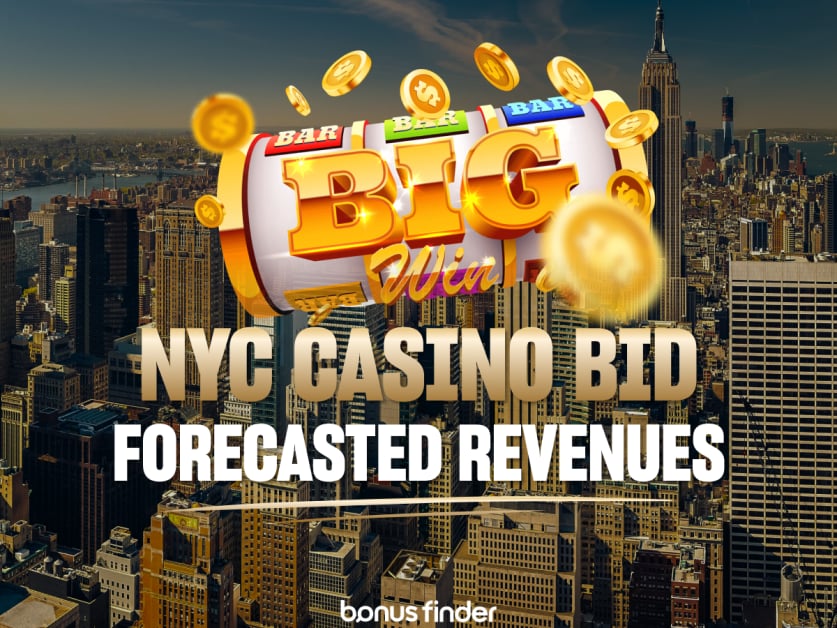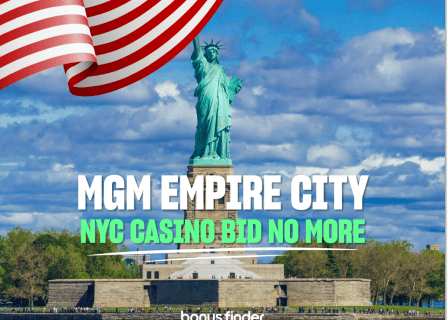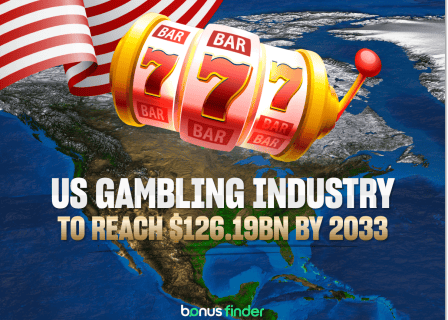Who will get the top three spots?
Proposals for three casino licenses in the New York City area, submitted to the New York State Gaming Facility Location Board (NYSGC), have forecasted revenues that could position them among the world’s most profitable casinos.
BonusFinder, a casino bonus comparison site, dives into everything you need to know about the ongoing NYC casino license bid.
Bidding process and other notable proposals
The bidding process is in the hopes to secure one of the three New York City licenses. The bids await approval from state and local officials before advancing to the location board, which will select winners by the end of 2025 – the board plans to pick the winners by December 1.
If approved, these massive projects would mark the debut of full-scale casinos in the nation’s largest city, as well as boosting the local areas in which they operate.
The competition process has been intense over the last three years, with each casino license costing $500m. Prospective operators will also be required to commit $500m of minimum capital investment.
As outlined by the NYSGC, the $1bn baseline minimum reflects the massive outlay and the vast potential returns to be generated from the landmark NYC venues. Below we look into who’s in the running for New York’s eight new casino licenses and how much revenue potential they have.
Freedom Plaza revenue potential
The Freedom Plaza project in Manhattan anticipates $2.2bn revenue in its inaugural year, climbing to $4.2bn by the end of its first decade, with a pledge to bring “unparalleled benefits to the neighborhood”.
In addition to the 295,000 sq ft casino, the site will comprise 513 affordable housing units within its 1,047-apartment residential block and a 4.7-acre open green space.
It will also contain more than 1,200 hotel rooms, meeting and conference facilities, as well as leisure, wellness and parking provisions.
Freedom Plaza has been designed by the Soloviev Group in collaboration with its operator partner, Mohegan Gaming and Entertainment.
The expansive civic and cultural space proposed for Midtown’s East Side has gained the approval of 57% of voters in the area, with a desire expressed for affordable housing (91%) and accessible green space (83%), according to Tulchin Research.
Metropolitan Park revenue potential
Elsewhere, billionaire Steve Cohen’s initiative near Citi Field in Queens projects $3.9bn annually by year three, based on executive summaries filed with the board.
That project includes a casino, hotel, live music venue, restaurants and 25 acres of green space.
These figures compete well with global heavyweights like Las Vegas Sands Corp’s Marina Bay Sands in Singapore, which earned $4.2bn in 2024, and Wynn Resorts plus the Encore in Las Vegas, generated $2.57bn in revenue combined last year.
Coney Island revenue potential
The Coney Island project, backed by real estate investor Joe Sitt, provided detailed estimates, projecting $669m from table games and $754m from slots in its first year. This would outpace Wynn’s $611m in table games and $446m in slots for 2024.
Caesars Time Squares revenue potential
In terms of other notable proposals, Caesars Entertainment envisions a Times Square casino generating $23.3bn in gambling revenue over a decade.
The company’s spokesperson mooted the potential to deliver “historic tax revenue” for NYC: “We see all of Times Square becoming the resort, with local restaurants, hotels and Broadway theaters all directly benefiting.”
The Avenir revenue potential
Developer Larry Silverstein’s The Avenir project forecasts $2.5bn in its first full year, arguing that a Manhattan casino would maximize state revenue, supported by a Spectrum Gaming Group study estimating $2.1bn from a Manhattan site versus lower returns from outer areas.
“It is not in the economic interest of Manhattan to force its tourists to travel to other boroughs to enjoy gaming and its amenities,” said The Avenir executive summary.
Empire City Casino & Resorts World revenue potential
MGM Resorts International, currently operating a slot-only facility in Yonkers, and Genting Group’s Resorts World, with a similar setup near Aqueduct racetrack, predict revenue surges if table games and sports betting are permitted.
MGM estimates up to $1.39bn annually, while Resorts World projects $2.2bn by 2027.
Bally’s Bronx revenue potential
Bally’s Corporation anticipates $1bn yearly, with $200m in gaming taxes. Bally’s recently moved a step closer to finalizing its plan to develop a casino on a section of the former Trump Golf Links site at Ferry Point in the Bronx, after the city council approved a legislative measure.
Previously, a lack of progress at council level had frustrated the application process, but that has now been overcome. Meetings had been adjourned for further dialogue, but eventually a vote materialized.
The home rule message required 34 votes to be passed, without the backing of Mayor Eric Adams, but the leader provided his support, meaning only a simple majority would be needed.
In the end, the vote was carried with 32 for and 12 against, and seven abstentions.
Bally’s took ownership of the golf course in 2023 and immediately renamed it, Bally’s Golf Links at Ferry Point.
As part of the transaction, the US betting and entertainment giant agreed to pay the Trump Organization a further $115m if it could obtain one of three available New York state casino licenses.
During the process, this aspect of the deal has opened up a point of contention, with opponents pointing to President Trump gaining an indirect financial boost to his private company from the delivery of a Ferry Point casino.
That is not guaranteed at present, but if the application is successful, the rest should be a formality. However, Bally’s $4bn Bronx casino project has hit a recent roadblock – with the council voting against land-use changes.
Remaining challenges for casino operators
With the application process now concluded, all the hopefuls must wait for the outcome.
As part of the bidding process, applicants will propose their own tax rates, starting at a minimum 10% for table games and 25% for slots, to optimize state revenue.
Applicants will be eager to receive the green light, to develop the sites, but further challenges will lie ahead, especially with the figures, as revenue projections can be optimistic.
For example, upstate New York’s initial four casinos and Bally’s temporary Chicago site in 2023 underperformed expectations.
Ultimately, the success of these large-scale projects hinges on regulatory approval, economic feasibility and market dynamics, with final outcomes still months away.








